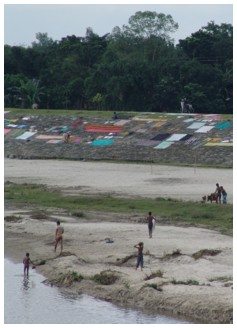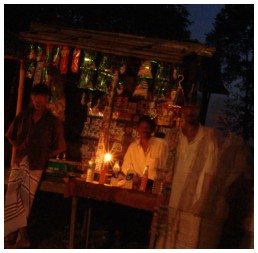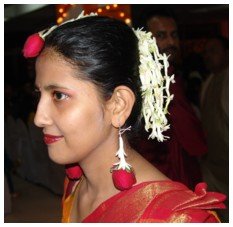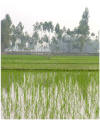|
 As
most of the houses have no running water in rural areas, a major part of
life centers around the river. People wash themselves as well as their
clothes in the river or the pond. From the car, you see sometimes women,
completely covered in a sari, get into the water, and then suddenly you
see a head and a floating sari. As
most of the houses have no running water in rural areas, a major part of
life centers around the river. People wash themselves as well as their
clothes in the river or the pond. From the car, you see sometimes women,
completely covered in a sari, get into the water, and then suddenly you
see a head and a floating sari.
The wash is done in the river and, as can be seen from the picture, is
left out to dry on the side. Many people get their water from pump, but
they are often not close to the house and as washing takes a lot of water,
it is much easier to carry your clothes to the water than to carry many
buckets of water towards your clothes.
The river is also a source of fun. Many children, mostly boys, and
sometimes men, are swimming as soon as the school or working day is over.
When driving from village to village along the small roads, you see many
little shops on the left and right side. At night this is especially nice,
as they all have a small lamp or candle shining, and men are always
gathering around it, having their social time.
The goods you can buy are unfortunately not so attractive, being mainly
sweets and crisps, many of them well beyond due date, but the little
lights certainly add to the atmosphere.
When the harsh ninth month of Ramadan has arrived, the sunny days consist
of one long gloomy waiting period: for Iftar to come. The whole day eating
is not allowed, and for an unclear reason (at least unclear to me) the
favorite food after a day of fasting is deep-fried and most of it is
sweet. Also puffed rice is very popular. From 5 o'clock, the streets are
getting empty, everybody is running towards the little stalls where the
Iftar food is exhibited, to buy big bags with different kinds of greasy
food, only to mix them before eating afterwards. I love to get invited to
the Iftar parties, but after a week or so, I also crave for fresh fruit
and green leafy vegetables. |
  Marriage
is a big issue in Bangladesh; its celebration is split up in several days
and takes about 5 days, and the dowries and costs are so high, that parents,
especially parents of the bride,
have to suffer for half a lifetime. This is one of the reasons girls still
are married out young; the older the girl, the higher the dowry that must be
paid. And in this country, 25 is already old for an unmarried girl. Even
though the law forbids marriage under 18, lots of girls still marry at their
14th. Marriage
is a big issue in Bangladesh; its celebration is split up in several days
and takes about 5 days, and the dowries and costs are so high, that parents,
especially parents of the bride,
have to suffer for half a lifetime. This is one of the reasons girls still
are married out young; the older the girl, the higher the dowry that must be
paid. And in this country, 25 is already old for an unmarried girl. Even
though the law forbids marriage under 18, lots of girls still marry at their
14th.
On the first day, the Gaye Holud ceremony, the party given
by the bride's parents, is held. Holud means turmeric, the yellow curry-like spice
that is used in many Bangladeshi and Indian dishes. The turmeric is
put on the face of the bride and the groom.
The bride is by tradition dressed in a beautiful red sari. In the middle
of a room, two decorated chairs are put and on this day, she sits there
all alone, and in most of the cases that we have attended, completely
unsmiling. Rows of chairs are facing her, where the guest can take place
to endlessly admire her timeless beauty. After the admiration, the guests
receive a dinner as reward. Normally, huge numbers of guests are invited,
ranging between a hundred and thousands. When one load of guests is having
dinner, the next load is already waiting behind the chairs. |
|
The birth of a child is
obviously also an important occasion. Minimally one week after its birth,
the Akika (Aqiqah) is performed for Muslim children. Akika is the
name-giving ceremony. A strand of hair is taken from the baby by the imam
and in exchange it gets some honey. The father has to secretly bury that
hair. Goats are to be slaughtered - two if it is a boy, one if it is a
girl. Gender empowerment is still a minor issue here. Consequently, there
will be an enormous party, where food has to be served for hundreds of
guests. The food will be distributed evenly: one third for the poor, one
third for distant relatives and one third for the parents and close
relatives. Some poor families will be in deep financial trouble as a
result of these kinds of ceremonies, but they find these expenses
unavoidable for the well-being of their newly born. |
|
 If
a public activity takes place, the streets will be flooded with policemen.
Especially if there is a hartal, a protest, or a visit of a high level
official from abroad, all police men are brought in from all over the
country. (A smart terrorist might grab his chances outside
Dhaka
days like these). But apart from the usual police, there is also the RAB
(Rapid Action Battalion). This RAB “elite anti-crime corps” was put into
life in 2003 by the government. Their members look very grim and dark and
are clad in the same black shirts, trousers, shoes, sunglasses and head
scarf. The battalion is extremely active: over 2005 about 600 people have
been killed “in crossfire” by them. Seemingly, the victims even fire back
when they are chained, and especially if they happen to be members of for
instance a forbidden political party. If
a public activity takes place, the streets will be flooded with policemen.
Especially if there is a hartal, a protest, or a visit of a high level
official from abroad, all police men are brought in from all over the
country. (A smart terrorist might grab his chances outside
Dhaka
days like these). But apart from the usual police, there is also the RAB
(Rapid Action Battalion). This RAB “elite anti-crime corps” was put into
life in 2003 by the government. Their members look very grim and dark and
are clad in the same black shirts, trousers, shoes, sunglasses and head
scarf. The battalion is extremely active: over 2005 about 600 people have
been killed “in crossfire” by them. Seemingly, the victims even fire back
when they are chained, and especially if they happen to be members of for
instance a forbidden political party.
Protests are regularly uttered by human rights activists and journalists,
but the reaction of the government is, that “encounter killings” happen
all over the world. At least, they state, serious crime has dropped by
half.
 The
year in
Bangladesh, has six seasons, and as a
result, different varieties of rice are cultivated. There are three
different varieties, namely aus, aman and boro, and all grow under
different circumstances. The aman rice is sown in the rainy season and
needs no irrigation. Unfortunately, this year the amount of rain was
rather small and therefore, the aman harvest is insufficient. As the rice
supply normally just meets the demand, the gap will have to be bridged by
the production of boro rice. This variety however grows in winter and as
it hardly rains in that period, a considerable irrigation is needed, which
again puts a pressure on the electricity demand. The
year in
Bangladesh, has six seasons, and as a
result, different varieties of rice are cultivated. There are three
different varieties, namely aus, aman and boro, and all grow under
different circumstances. The aman rice is sown in the rainy season and
needs no irrigation. Unfortunately, this year the amount of rain was
rather small and therefore, the aman harvest is insufficient. As the rice
supply normally just meets the demand, the gap will have to be bridged by
the production of boro rice. This variety however grows in winter and as
it hardly rains in that period, a considerable irrigation is needed, which
again puts a pressure on the electricity demand.
In the month of August already, without any irrigation, the electricity
demand by far exceeds the supply and power cuts are a daily occurrence,
from 3-4 hours in Dhaka
to double that length in
rural areas. Rice is the absolute most
popular staple food in Bangladesh. There is no scope for extra supply of
electricity, without further damaging the daily life in Bangladesh. The
year 2006 will be another long and difficult year for the poor and hungry
people. |

 Marriage
is a big issue in Bangladesh; its celebration is split up in several days
and takes about 5 days, and the dowries and costs are so high, that parents,
especially parents of the bride,
have to suffer for half a lifetime. This is one of the reasons girls still
are married out young; the older the girl, the higher the dowry that must be
paid. And in this country, 25 is already old for an unmarried girl. Even
though the law forbids marriage under 18, lots of girls still marry at their
14th.
Marriage
is a big issue in Bangladesh; its celebration is split up in several days
and takes about 5 days, and the dowries and costs are so high, that parents,
especially parents of the bride,
have to suffer for half a lifetime. This is one of the reasons girls still
are married out young; the older the girl, the higher the dowry that must be
paid. And in this country, 25 is already old for an unmarried girl. Even
though the law forbids marriage under 18, lots of girls still marry at their
14th.